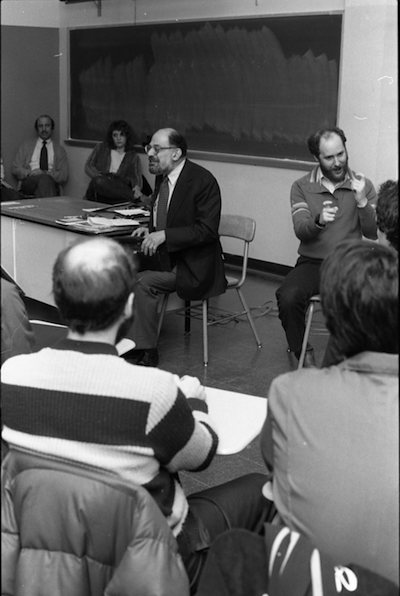Videos capture signed performances of works by poets from Robert Panara to Allen Ginsberg.
Rochester Institute of Technology’s National Technical Institute for the Deaf will digitize and make publicly accessible more than 60 videotapes held in the RIT/NTID Deaf Studies Archive that document the ASL poetry and literature movement in Rochester from 1970 through 2011. The videotapes will represent the largest collection of publicly accessible rare ASL literature.
This project is supported by a Digitizing Hidden Collections grant from the Council on Library and Information Resources (CLIR). The grant program is made possible by funding from The Andrew W. Mellon Foundation.

RIT/NTID will digitize and make publicly accessible videos that document the ASL poetry and literature movement thanks to a Digitizing Hidden Collections grant from the Council on Library and Information Resources. One of the recordings includes noted beat poet Allen Ginsberg (center) visiting NTID faculty member Robert Panara’s class in 1984. Credit: A. Sue Weisler
Joan Naturale, NTID librarian and co-principal investigator for the grant, said this project will make important works of deaf culture available to the masses. “The once ‘hidden’ work of this pioneering and under-represented group will be made public for the first time, broadening access to the cultural heritage of this diverse group little known outside of the deaf community and enriching interdisciplinary studies in linguistics, poetry, performing arts, and cinema,” Naturale said.
Over the course of the next year, staff from RIT Libraries and NTID will work to digitize, caption, voice and transcribe the videos and make them available through online portals including New York Heritage, which feeds into the Digital Public Library of America. The recordings capture performances by deaf poets such as Robert Panara, NTID’s first deaf faculty member; Clayton Valli, referred to by critics as “the Deaf Robert Frost”; and more. Karen Christie, NTID faculty emeritus, will provide additional background information about the performances.
“ASL is a visual language and not a direct translation of English,” said Naturale. “Each poet has a unique sign language expressive style, which range from Panara’s transliteration of traditional English works and Shakespeare into contact sign with ASL features, to the avant-garde ASL and spoken English hybrid work of the deaf and hearing ‘Flying Words’ duo Cook and Lerner, to Valli’s original poetry created solely in ASL that uses body language, rhythm and movement to create a spatial expression.”
The city of Rochester boasts one of the highest deaf populations per capita in the nation and was at the forefront of the ASL poetry movement in the U.S.
“NTID had a leading role, hosting national conferences on ASL literature attended by deaf and hearing scholars, students, interpreters and the public,” said Naturale. “Recognition of the scholarly and artistic value of the work gained momentum through these conferences. One of the recordings includes noted beat poet Allen Ginsberg visiting Panara’s class. Panara performed some of his poems, including his award-winning poem, On His Deafness. When Ginsberg read a few lines from his poem Howl, a pivotal moment occurred when Patrick Graybill translated ‘hydrogen jukebox’ into ASL and even Ginsberg realized Graybill had visually captured the image.”
The project will help commemorate NTID’s 50th anniversary. For more information about additional plans to mark the occasion, visit https://www.ntid.rit.edu/
About Rochester Institute of Technology
Rochester Institute of Technology is home to leading creators, entrepreneurs, innovators and researchers. Founded in 1829, RIT enrolls about 19,000 students in more than 200 career-oriented and professional programs, making it among the largest private universities in the U.S.
The university is internationally recognized and ranked for academic leadership in business, computing, engineering, imaging science, liberal arts, sustainability, and fine and applied arts. RIT also offers unparalleled support services for deaf and hard-of-hearing students. The cooperative education program is one of the oldest and largest in the nation. Global partnerships include campuses in China, Croatia, Dubai and Kosovo.
For news, photos and videos, go to www.rit.edu/news.

